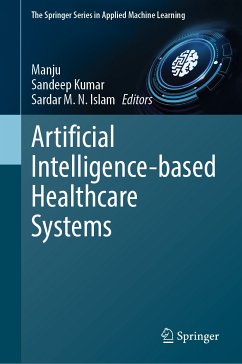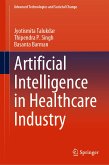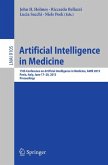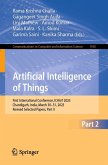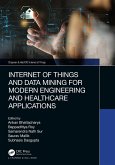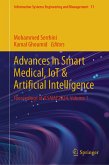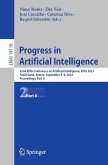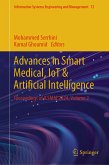Artificial Intelligence-based Healthcare Systems (eBook, PDF)
Gebundener Preis 160,49 €**
149,79 €**
**Bis zum 31.03.2025 gebundener Aktionspreis des Verlages
inkl. MwSt. und vom Verlag festgesetzt.

0 °P sammeln
Artificial Intelligence-based Healthcare Systems (eBook, PDF)
- Format: PDF
- Merkliste
- Auf die Merkliste
- Bewerten Bewerten
- Teilen
- Produkt teilen
- Produkterinnerung
- Produkterinnerung

Bitte loggen Sie sich zunächst in Ihr Kundenkonto ein oder registrieren Sie sich bei
bücher.de, um das eBook-Abo tolino select nutzen zu können.
Hier können Sie sich einloggen
Hier können Sie sich einloggen
Sie sind bereits eingeloggt. Klicken Sie auf 2. tolino select Abo, um fortzufahren.

Bitte loggen Sie sich zunächst in Ihr Kundenkonto ein oder registrieren Sie sich bei bücher.de, um das eBook-Abo tolino select nutzen zu können.
This book explores new applications in the field of science and technology for healthcare systems. The main focus of this book is to devise smart, efficient and robust solutions for the health care sector to serve the major population of rural areas. Artificial Intelligence-based Healthcare Systems encourages scientists, engineers, and scholars across the multiple disciplines to design smart intelligent innovations on rural healthcare issues and motivate to collaborate multiple ideas to design best solutions. It also helps the readers at various levels of knowledge to further enhance their understanding for new tools and smart solutions.…mehr
- Geräte: PC
- ohne Kopierschutz
- eBook Hilfe
- Größe: 10.43MB
- Upload möglich
Andere Kunden interessierten sich auch für
![Artificial Intelligence in Healthcare Industry (eBook, PDF) Artificial Intelligence in Healthcare Industry (eBook, PDF)]() Jyotismita TalukdarArtificial Intelligence in Healthcare Industry (eBook, PDF)105,95 €
Jyotismita TalukdarArtificial Intelligence in Healthcare Industry (eBook, PDF)105,95 €![Artificial Intelligence in Medicine (eBook, PDF) Artificial Intelligence in Medicine (eBook, PDF)]() Artificial Intelligence in Medicine (eBook, PDF)40,95 €
Artificial Intelligence in Medicine (eBook, PDF)40,95 €![Artificial Intelligence of Things (eBook, PDF) Artificial Intelligence of Things (eBook, PDF)]() Artificial Intelligence of Things (eBook, PDF)61,95 €
Artificial Intelligence of Things (eBook, PDF)61,95 €![Internet of Things and Data Mining for Modern Engineering and Healthcare Applications (eBook, PDF) Internet of Things and Data Mining for Modern Engineering and Healthcare Applications (eBook, PDF)]() Internet of Things and Data Mining for Modern Engineering and Healthcare Applications (eBook, PDF)47,95 €
Internet of Things and Data Mining for Modern Engineering and Healthcare Applications (eBook, PDF)47,95 €![Advances in Smart Medical, IoT & Artificial Intelligence (eBook, PDF) Advances in Smart Medical, IoT & Artificial Intelligence (eBook, PDF)]() Advances in Smart Medical, IoT & Artificial Intelligence (eBook, PDF)145,95 €
Advances in Smart Medical, IoT & Artificial Intelligence (eBook, PDF)145,95 €![Progress in Artificial Intelligence (eBook, PDF) Progress in Artificial Intelligence (eBook, PDF)]() Progress in Artificial Intelligence (eBook, PDF)65,95 €
Progress in Artificial Intelligence (eBook, PDF)65,95 €![Advances in Smart Medical, IoT & Artificial Intelligence (eBook, PDF) Advances in Smart Medical, IoT & Artificial Intelligence (eBook, PDF)]() Advances in Smart Medical, IoT & Artificial Intelligence (eBook, PDF)145,95 €
Advances in Smart Medical, IoT & Artificial Intelligence (eBook, PDF)145,95 €-
-
-
This book explores new applications in the field of science and technology for healthcare systems. The main focus of this book is to devise smart, efficient and robust solutions for the health care sector to serve the major population of rural areas. Artificial Intelligence-based Healthcare Systems encourages scientists, engineers, and scholars across the multiple disciplines to design smart intelligent innovations on rural healthcare issues and motivate to collaborate multiple ideas to design best solutions. It also helps the readers at various levels of knowledge to further enhance their understanding for new tools and smart solutions.
Produktdetails
- Produktdetails
- Verlag: Springer Nature Switzerland
- Erscheinungstermin: 26. Oktober 2023
- Englisch
- ISBN-13: 9783031419256
- Artikelnr.: 69218212
- Verlag: Springer Nature Switzerland
- Erscheinungstermin: 26. Oktober 2023
- Englisch
- ISBN-13: 9783031419256
- Artikelnr.: 69218212
- Herstellerkennzeichnung Die Herstellerinformationen sind derzeit nicht verfügbar.
Dr. Manju has received Ph.D. in Computer engineering from Delhi University, New Delhi, India in 2018. She has obtained Master’s degree in Computer and Communication Engineering from LNMIIT, Jaipur, India in 2009 and Bachelor degree in Computer Engineering from Govt. Engineering College Kota, India in 2006. She has published more than 30 publications in reputed international journals and conferences. Presently, she is working as an Assistant Professor in the Department of Computer Science & Engineering at Jaypee Institute of Information Technology (JIIT), Noida, India. Her research interest focused on Artificial Intelligence, Adhoc Networks, Internet of Things Network, Fog/Edge Computing.
Dr. Sandeep Kumar received the B.E. degree in computer science and engineering from Engineering College Kota, in 2005, the MTech degree in computer science and engineering from RTU Kota, in 2011, the Ph.D. degree in the field of nature inspired computing and PDF in 2022 from Imam Muhammad ibn Saud Islamic University, Riyadh, Saudi Arabia on usage of modern technologies to predict the emergence of infectious diseases and detect pandemic outbreak. He is currently Professor with the Department of Computer Science and Engineering, CHRIST (Deemed to be University), Bangalore. He has published more than 80 research articles in refereed journals and international conferences, and edited four books and five conference proceedings. He is an associate editor for "Human-centric Computing and Information Sciences (HCIS, Springer). His research interests include nature-inspired algorithms, swarm intelligence, soft computing, and computational intelligence.
Dr. Sardar M N Islam: Prof. Sardar M. N. Islam (Naz) currently a Professor, Victoria University, Australia.
He is also a Distinguished Visiting Professor of Artificial Intelligence, UnSri and a Distinguished Visiting Professor, AURAK 2019 – 2021, Adjunct Professor of IT and Business, Armstrong Institute, Melbourne and Editor-in-Chief of “International Transactions on Artificial Intelligence". Professor Sardar M. N. Islam adopts a global and humanistic approach in his research and academic works. He has undertaken rigorous scientific studies of emerging issues of computer science and other different disciplines. His academic work has gained international acclaim resulting in considerable (1) Honours and Awards, (1) many visiting or adjunct professorial appointments in different countries, (2) many appointments in editorial roles of journals and (3) a large number of keynote speeches at international conferences in several countries. He has published 31 (+4 forthcoming books) scholarly authored academic books with prestigious international publishers in different disciplines, including computer science. Each of these books makes significant scientific contributions to the literature. These books are published by prestigious publishers, and the majority of books are published in highly regarded book
series. He has also published about 250 articles, including some of the top leading international journal articles in his specialized research areas, including computer science.
Dr. Sandeep Kumar received the B.E. degree in computer science and engineering from Engineering College Kota, in 2005, the MTech degree in computer science and engineering from RTU Kota, in 2011, the Ph.D. degree in the field of nature inspired computing and PDF in 2022 from Imam Muhammad ibn Saud Islamic University, Riyadh, Saudi Arabia on usage of modern technologies to predict the emergence of infectious diseases and detect pandemic outbreak. He is currently Professor with the Department of Computer Science and Engineering, CHRIST (Deemed to be University), Bangalore. He has published more than 80 research articles in refereed journals and international conferences, and edited four books and five conference proceedings. He is an associate editor for "Human-centric Computing and Information Sciences (HCIS, Springer). His research interests include nature-inspired algorithms, swarm intelligence, soft computing, and computational intelligence.
Dr. Sardar M N Islam: Prof. Sardar M. N. Islam (Naz) currently a Professor, Victoria University, Australia.
He is also a Distinguished Visiting Professor of Artificial Intelligence, UnSri and a Distinguished Visiting Professor, AURAK 2019 – 2021, Adjunct Professor of IT and Business, Armstrong Institute, Melbourne and Editor-in-Chief of “International Transactions on Artificial Intelligence". Professor Sardar M. N. Islam adopts a global and humanistic approach in his research and academic works. He has undertaken rigorous scientific studies of emerging issues of computer science and other different disciplines. His academic work has gained international acclaim resulting in considerable (1) Honours and Awards, (1) many visiting or adjunct professorial appointments in different countries, (2) many appointments in editorial roles of journals and (3) a large number of keynote speeches at international conferences in several countries. He has published 31 (+4 forthcoming books) scholarly authored academic books with prestigious international publishers in different disciplines, including computer science. Each of these books makes significant scientific contributions to the literature. These books are published by prestigious publishers, and the majority of books are published in highly regarded book
series. He has also published about 250 articles, including some of the top leading international journal articles in his specialized research areas, including computer science.
Schedule and Routing In Home Healthcare System Using Clustering Analysis and Multi-Objective Optimization.- Obesity level prediction using Multinomial Logistic Regression.- Importance of Feature Selection methods in Machine Learning-based Obesity Prediction.- A Clinical Decision Support System Using Machine Learning To Forecast The Risk Of Chronic Pulmonary Disease And Anthracosis.- Smart Healthcare: A Breakthrough in the growth of technologies.- A Multidisciplinary Explanation of Healthcare AI Uses, Trends and Possibilities.- Optimum Utilization Of Bed Resources In Hospitals-A Stochastic Approach.- Early-Detection of Diabetic Retinopathy using Deep Learning.- Performance Analysis of Memory-Efficient Vision Transformers in Brain Tumor Segmentation.- Unlocking New Possibilities in Drug Discovery: A GAN-based Approach.- A Systematic Review on ECG and EMG Biomedical Signal using Deep Learning Approaches.- Smart AI bot for healthcare Assistance.- AI-Driven Hospital Readmission Predictor for Diabetic Patients.- Gleason Grading System for Prostate Cancer diagnosis.
Schedule and Routing In Home Healthcare System Using Clustering Analysis and Multi-Objective Optimization.- Obesity level prediction using Multinomial Logistic Regression.- Importance of Feature Selection methods in Machine Learning-based Obesity Prediction.- A Clinical Decision Support System Using Machine Learning To Forecast The Risk Of Chronic Pulmonary Disease And Anthracosis.- Smart Healthcare: A Breakthrough in the growth of technologies.- A Multidisciplinary Explanation of Healthcare AI Uses, Trends and Possibilities.- Optimum Utilization Of Bed Resources In Hospitals-A Stochastic Approach.- Early-Detection of Diabetic Retinopathy using Deep Learning.- Performance Analysis of Memory-Efficient Vision Transformers in Brain Tumor Segmentation.- Unlocking New Possibilities in Drug Discovery: A GAN-based Approach.- A Systematic Review on ECG and EMG Biomedical Signal using Deep Learning Approaches.- Smart AI bot for healthcare Assistance.- AI-Driven Hospital Readmission Predictor for Diabetic Patients.- Gleason Grading System for Prostate Cancer diagnosis.
Schedule and Routing In Home Healthcare System Using Clustering Analysis and Multi-Objective Optimization.- Obesity level prediction using Multinomial Logistic Regression.- Importance of Feature Selection methods in Machine Learning-based Obesity Prediction.- A Clinical Decision Support System Using Machine Learning To Forecast The Risk Of Chronic Pulmonary Disease And Anthracosis.- Smart Healthcare: A Breakthrough in the growth of technologies.- A Multidisciplinary Explanation of Healthcare AI Uses, Trends and Possibilities.- Optimum Utilization Of Bed Resources In Hospitals-A Stochastic Approach.- Early-Detection of Diabetic Retinopathy using Deep Learning.- Performance Analysis of Memory-Efficient Vision Transformers in Brain Tumor Segmentation.- Unlocking New Possibilities in Drug Discovery: A GAN-based Approach.- A Systematic Review on ECG and EMG Biomedical Signal using Deep Learning Approaches.- Smart AI bot for healthcare Assistance.- AI-Driven Hospital Readmission Predictor for Diabetic Patients.- Gleason Grading System for Prostate Cancer diagnosis.
Schedule and Routing In Home Healthcare System Using Clustering Analysis and Multi-Objective Optimization.- Obesity level prediction using Multinomial Logistic Regression.- Importance of Feature Selection methods in Machine Learning-based Obesity Prediction.- A Clinical Decision Support System Using Machine Learning To Forecast The Risk Of Chronic Pulmonary Disease And Anthracosis.- Smart Healthcare: A Breakthrough in the growth of technologies.- A Multidisciplinary Explanation of Healthcare AI Uses, Trends and Possibilities.- Optimum Utilization Of Bed Resources In Hospitals-A Stochastic Approach.- Early-Detection of Diabetic Retinopathy using Deep Learning.- Performance Analysis of Memory-Efficient Vision Transformers in Brain Tumor Segmentation.- Unlocking New Possibilities in Drug Discovery: A GAN-based Approach.- A Systematic Review on ECG and EMG Biomedical Signal using Deep Learning Approaches.- Smart AI bot for healthcare Assistance.- AI-Driven Hospital Readmission Predictor for Diabetic Patients.- Gleason Grading System for Prostate Cancer diagnosis.
